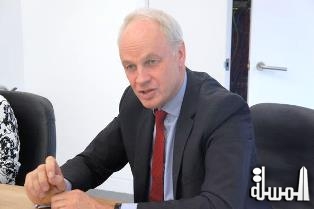
Tourism heavyweight sees untapped potential in Asia
LONDON "Asia is gradually becoming the epicenter of the travel and tourism industry." So said David Scowsill, CEO of the World Travel & Tourism Council in a recent interview with the Nikkei Asian Review.
To meet vast potential demand, each country needs to build infrastructure and promote open skies within their regions, he said.
The WTTC has more than 140 chief executives of the world’s major airlines, travel agencies and hotel chains. The organization held a global summit in Sendai, Japan, in 2012, in the aftermath of the 2011 earthquake that struck the north of the country. It plans to have its next gathering in Bangkok next year, in recognition of Asia’s growing importance.

Scowsill said the potential of the travel and tourism industry is not fully understood by policymakers. It employs about 284 million people worldwide and accounts for nearly 10% of world gross domestic product. The sector is expected to grow by 3.1% in the first half of 2016, outpacing the growth of the global economy, at 2.3%.
ON THE MOVE A turning point came around 2010. By that year, the number of Chinese traveling overseas had surged to 58 million from 10 million a decade earlier. By 2015, the number had reached 125 million. It is estimated that 200 million Chinese will travel abroad by 2020. "What’s happened in the last five years or so," said Scowsill, "is that the outbound market in China has become more important to countries that are accepting tourists." He cited the Japanese government’s decision to simplify visa application procedures and other measures for the sharp rise in tourists visiting the country, primarily Chinese.
Asia is also likely to see strong growth as a destination. In 2015, spending by inbound travelers rose 4.6% on the year to $526 billion, making Asia the second-largest market after Europe. While growth is shrinking in Europe due to a string of terrorist attacks and other factors, demand for travel to Asia remains strong. "Boeing or Airbus — look at their projections of where they are selling their aircraft over the next 20 years, and it is all into Asia," Scowsill said. "Not just big carriers, but all the low-cost carriers like Jestar or AirAsia."
Asian countries need to develop their infrastructure and make more attractive offers, Scowsill said. "Most people who go to Asia," he said, "want to go to more than one country, say three days in Tokyo and Osaka and three days in Hong Kong. But Asian countries are not very good at marketing themselves together."
Asian countries must take steps that enable people to move more smoothly within the region, Scowsill said. It is crucial for the Association of Southeast Asian Nations to digitize visa application procedures within the group, and to negotiate open skies agreements that make it easier for airlines, including low-cost carriers, to enter new markets. "Eventually, the bloc of ASEAN countries will be the same as the European Union, so that people can fly anywhere and you can get one visa for those ASEAN countries," he said.
It is also important for each country to build more and better infrastructure. Comprehensive long-term plans for high-speed railways and high-standard highways — not just airport runways and terminals — are vital, according to Scowsill. "One of the things we say to the governments is that you have to plan in advance — 15 to 20 years in advance — particularly with airport capacity and runway capacity. And these days, it is often complicated and takes a long time to get permission to build a new runway or a new terminal," he said
The threat of terrorism casts a dark shadow over the whole travel and tourism industry, Scowsill said. "It is a real global problem, and it is not going to go away." But he said he does not think terrorist attacks will sharply weaken travel demand in a globalized society. "People are much more resilient these days and they will still continue to travel," he said. For the travel industry to minimize the impact of terrorist attacks, it should "mainly be very clear about and communicating what is going on," Scowsill said.
Source :Tourism-heavyweight-sees-untapped-potential-in-Asia"> http://asia.nikkei.com/magazine/20160915-SOCIAL-REVOLUTION/Business/Tourism-heavyweight-sees-untapped-potential-in-Asia








